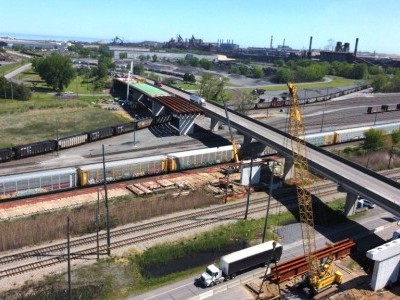Europe’s largest port warns virus impact to become more severe
The coronavirus is set to further damage trade in the coming months, threatening supply chains and upending commerce like never before, according to the head of Europe’s largest port, Rotterdam.
“We are facing unprecedented disruptions and the port of Rotterdam, as a vital process, intends to continue contributing to society,” port Chief Executive Officer Allard Castelein said in a statement. The true impact on the decline in demand will become clear from April onwards, he said, adding that throughput at the port could slump significantly in the coming months.
Europe’s largest ports—essential to the delivery of food, medicine and other vital materials—are being tested to the limit as the outbreak consumes the continent. The challenges are myriad: preventing delays, ensuring that goods aren’t contaminated, managing congestion amid ship quarantines, and keeping their own workforce healthy.
Even at places where internal operations so far have been largely unaffected—such as at Rotterdam, where robots do much of the heavy lifting—the pain inflicted by the virus is evident. Overall throughput volume dropped 9.3% in the first quarter, compared with the same period last year, and a decline of as much as 20% on an annual basis is very likely, according to Castelein.
“This will depend on how long the measures remain in place and on how quickly production and world trade recover,” he said.
Governments across Europe are busy trying to limit the economic damage of containment measures while avoiding another surge in the spread of the disease. More than 50,000 people have died, though the number of new cases on the continent has stabilized in recent days. Germany is moving forward with plans to slowly start returning to normal, while the U.K. is expected to extend its nationwide lockdown.
Similar Stories

Jeffersonville port delivers record road salt shipments to Greater Louisville area during recent winter storms
View ArticleNC Ports Notice: Holiday Schedule Notice Martin Luther King Jr. Day
The Port of Wilmington Container Gate (South Gate) and the Charlotte Inland Port (CIP) will operate on a reduced schedule on Monday, January 20: 8 AM-12 PM and 1 PM-5…
View Article
Port of Long Beach’s Cordero hails ‘Green Port’ achievements
View Article
Port of San Diego accepts $5 million grant from the San Diego County Air Pollution Control District for clean air project
View Article
Adriatic Gate Container Terminal welcomes Bora Med Service
View Article
Savannah gets India cargo to market up to eight days faster
View ArticleGet the most up-to-date trending news!
SubscribeIndustry updates and weekly newsletter direct to your inbox!





